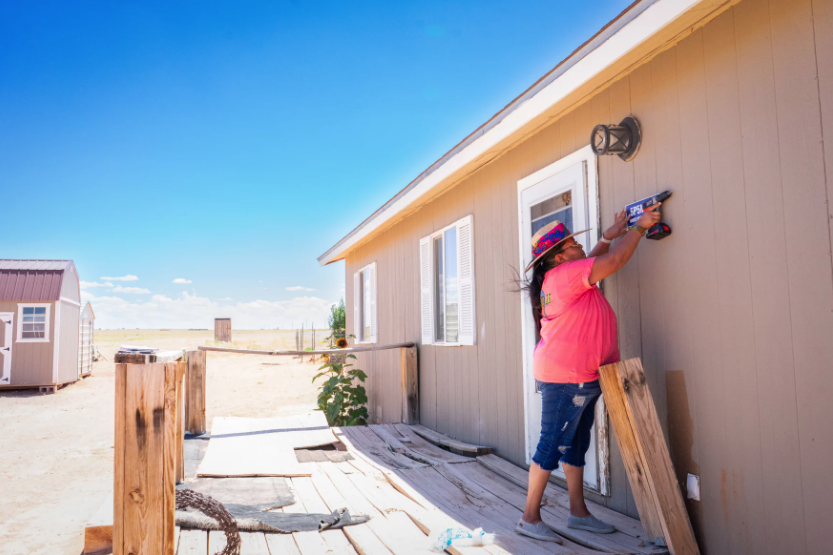Moab Times: Rural Utah Project changes life on Navajo Nation — with addresses

Read full article here: https://www.moabtimes.com/articles/rural-utah-project-changes-life-on-navajo-nation-with-addresses/
By Gwen Dilworth
When Daylene Redhorse worked in dialysis, she watched her patients living in the Navajo Nation grow exhausted traveling for treatment three times a week. They would have qualified for at-home care, but they didn’t have an address.

“Insurance wouldn’t cover it because they needed a physical address,” said Redhorse, an addressing specialist for Rural Utah Project.
That has now changed through the non-profit’s four-year effort to assign Google plus codes — coordinate-based markers for places without street names and numbers — to every home in Navajo Nation within Utah.
Today, 3,121 homes on the reservation sport blue plus code placards with white lettering, slightly larger than a license plate.
Redhorse said she’s witnessed two people receive at-home dialysis treatment. “Just to see that truck on the dirt road … that’s a big change,” she said.
Plus codes are an open source technology administered by Google that stand in for street addresses. Shorter than traditional latitude and longitude coordinates, they’re easy to share. They have been used in Kolkata, India to identify homes in densely populated areas and Somalia to help people access healthcare.
In 2018, Redhorse was trekking house to house in Navajo Nation, registering people to vote. She discovered that many people were registered in the wrong location — including herself. “A lot of people were registered in the wrong place,” she said. She realized that with addresses that pinpointed the exact location of a home, this could be corrected.
Rural Utah Project’s addressing initiative, which began in 2019, aimed to ensure that voters were registered accurately. But soon, they started to notice a host of other benefits: a Fed-Ex truck rumbling down the dirt road, quicker emergency vehicle response times, access to Wi-Fi connections and greater ease applying for college tuition assistance.
“It used to take [EMS and the fire department] a long time to get to the right [house],” she said.
Redhorse and field organizer Tara Benally spent four months using satellite imagery to identify buildings and classifying them as residential, vacant or sheds. Some of the “buildings” they identified turned out to be sheep corrals or boulders. “We visited every structure,” Redhorse said.
Other homes were challenging to reach. “But I made sure that I got to those roads,” she said.
Once homes were identified, Redhorse began assigning plus codes to each house. Some people were skeptical, she said. “It took us a while to gain trust from them.”
Some elders began bargaining with her, negotiating with Redhorse to take cats and dogs in exchange for a completed voter registration form. “I ended up with cats and dogs because I wanted that voter registration,” she said.
“…I made sure people registered to vote, I made sure people understood why I was there and … why it was important to vote.”

Redhorse follows in the footsteps of her parents. Growing up, her father drove people to the polls to vote and her mother translated. “Now I know what my mom and dad had faced,” she said.
Rural Utah Project registered over 1,600 voters in Navajo Nation in 2018. That year, San Juan County elected the first-ever Indigenous majority to the county commission.
Forty-seven percent of San Juan County’s population is Native American, according to the 2020 census.
Soon after the election, the commission withdrew the county’s support for reducing the size of Bears Ears National Monument and chose to rotate the location of the commission meetings throughout the county, making them more accessible to citizens.
San Juan County has the largest land area of any county in Utah, covering 7,821 square miles.
Redhorse said that though plus codes simplify many aspects of life, there is still work to be done. Many large companies, like Amazon and eBay, don’t formally use the codes. But, there are workarounds. Some local delivery drivers are familiar with the codes and will deliver directly to a home if a plus code is listed in an order description.
“Addresses are something that the rest of us take for granted,” said TJ Ellerbeck, the executive director of Rural Utah Project. “…the importance of an address can’t be understated. Everything from voting to emergency services to ordering a pizza. And it’s something that everybody deserves to have.”